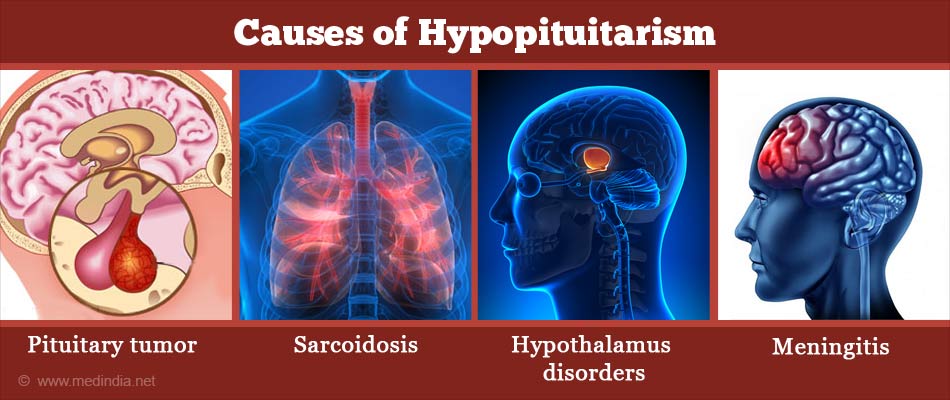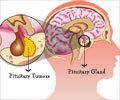- Adult hypopituitarism: Are we missing or is it clinical lethargy? K. S. Brar, M. K. Garg, and K. M. Suryanarayana Indian J Endocrinol Metab. 2011 Jul-Sep; 15(3): 170–174.
- Wikipedia - Hypopituitarism - (https://en.wikipedia.org/wiki/Hypopituitarism)
- Hypopituitarism - Causes and Symptoms - (https://www.mayoclinic.org/diseases-conditions/hypopituitarism/symptoms-causes/syc-20351645)
- Hypopituitarism - (https://www.hormone.org/diseases-and- conditions/pituitary/hypopituitarism)
- Hypopituitarism - What are the symptoms of hypopituitarism? - (https://www.pituitarysociety.org/patient-education/pituitary-disorders/hypopituitarism/what-are-the-symptoms-of-hypopituitarism )
- Hypopituitarism Disorders - (https://pituitary.org/knowledge- base/disorders/hypopituitarism)
- About Hypopituitarism - (https://medlineplus.gov/ency/article/000343.htm)
What is Hypopituitarism?
Hypopituitarism is a rare disorder of the pituitary gland in which the gland is unable to produce one or more of its eight different hormones in sufficient quantities. If there is a decreased secretion of one specific pituitary hormone, the condition is known as selective hypopituitarism, but if there is reduced secretion of most or all pituitary hormones, it is known as panhypopituitarism.
The pituitary gland is a small pea-sized gland located at the base of the brain, and closely connected with the hypothalamus. It has two lobes: the anterior pituitary, which consists of hormone-producing cells and the posterior pituitary, which consists of nervous tissue branching out of the hypothalamus. Hormones such as antidiuretic hormone (ADH), which regulates the osmolarity of the blood, and oxytocin, which regulates the contractions of the uterus during childbirth and breastfeeding are secreted by the posterior pituitary gland.
The secretion of hormones by anterior pituitary is regulated by the hypothalamus which secretes releasing hormones such as gonadotropin (LH and FSH)-releasing hormone, corticotropin-releasing hormone, thyrotropin-releasing hormone and growth hormone-releasing hormone into the blood vessels.
In response to these releasing hormones, the anterior pituitary produces its hormones namely
- TSH-Thyroid stimulating hormone
- ACTH- Adrenocorticotropic hormone
- LH- Luteinizing hormone
- FSH- Follicle stimulating hormone
- GH- Growth hormone or somatotropin
- PRL- Prolactin
All these hormones, in turn, stimulate effector hormone glands in the body to secrete thyroxine, cortisol, estradiol, progesterone, testosterone, and IGF-1 respectively which is regulated via a feedback mechanism. Prolactin acts directly on the mammary glands.
What are the Causes of Hypopituitarism?
The following factors can give rise to hypopituitarism:
- A pituitary tumor also known as pituitary adenoma is the most common cause of hypopituitarism. It is benign and can compress the rest of the pituitary gland and destroy its ability to produce hormones appropriately.
- Radiation therapy for a brain or pituitary tumor can destroy pituitary gland tissue.
- Chemotherapy.
- Infiltrative diseases, such as sarcoidosis can destroy the anterior pituitary. Autoimmune diseases such as lymphocytic hypophysitis damage the pituitary gland or its stalk.
- Sometimes gene mutations lead to impaired pituitary hormone production.
- Brain surgery.
- Hypopituitarism can also be caused by diseases of the hypothalamus as the hormones produced by the hypothalamus directly affect the activity of the pituitary.
- Head injury from an accident can also cause hypopituitarism by directly damaging the pituitary or by injuring either the hypothalamus or the pituitary stalk.
- Sheehan syndrome also known as postpartum pituitary gland necrosis- sometimes, extreme loss of blood during childbirth can damage the front part of the pituitary gland.
- Infections of the brain like meningitis.
- Hypopituitarism has also been known to be caused by bites from Russell's vipers.
- Tuberculosis.
- Certain conditions present at birth.
- Sometimes, it is idiopathic, i.e., the cause is unknown.

What are the Signs and Symptoms of Hypopituitarism?
Pituitary hormones control several functions of the body, and so, the signs and symptoms of hypopituitarism depend on the deficiency of that particular hormone. Usually, most of the anterior pituitary hormones are deficient rather than an individual hormone.
- Deficiency of LH and FSH leads to different symptoms in men and women. In men, it leads to loss of facial, trunk and scrotal hair, decreased muscle mass and anemia. In women, it results in menstrual irregularities like oligomenorrhea, amenorrhea and infertility. In both the sexes, it leads to a decrease in libido and loss of sexual function, and an increased risk of osteoporosis. Delayed puberty is reported in children with hypopituitarism.
- Deficiency of GH leads to impaired attention, memory, decrease in muscle mass, and increase in body fat around the waist. In children, it leads to growth retardation and short stature.
- Deficiency of ACTH leads to adrenal insufficiency characterized by lack of production of glucocorticoids such as cortisol by the adrenal gland. This leads to symptoms such as weight loss, fatigue, anemia, hypoglycemia, delayed puberty, adrenal crisis and low sodium levels and in extreme cases, collapse, shock, and vomiting.
- Deficiency of TSH leads to hypothyroidism characterized by tiredness, low heart rate, constipation, low blood pressure, weight gain, hair loss, intolerance to cold, slowed thinking and delayed growth in children sometimes leading to a syndrome called cretinism.
- Deficiency of prolactin leads to an inability to breastfeed.
- Deficiency of ADH leads to diabetes insipidus characterized by an inability to concentrate the urine, polyuria, dehydration, extreme thirst, and high sodium levels in the blood.
- Deficiency of oxytocin does not cause many symptoms due to its role only in parturition and breastfeeding.
How do you Diagnose Hypopituitarism?
If you have symptoms of pituitary disorder or if you have had radiation treatment or a recent head injury, then the doctor will perform various tests to check the presence of hypopituitarism by measuring the levels of hormones in your body. These tests include:
Blood tests: These are performed to check the deficiency of hormones due to pituitary failure and are of two types. Basal tests where blood samples are taken usually in the morning without any form of stimulation. The second one is stimulation or dynamic testing where blood tests are performed to check the body’s secretion of hormones after injecting certain medications that stimulate hormone productions.
Imaging tests: Magnetic resonance imaging (MRI) of the brain is performed to detect a pituitary tumor or other structural abnormality and sometimes CT scan with radiocontrast is preferred if MRI is not available.

Vision tests: Perimetry tests are carried out to determine if the growth of a pituitary tumor has damaged the sight or visual fields.
How do you Treat Hypopituitarism?
Treatment of hypopituitarism generally involves elimination of the underlying cause, replacing the deficient hormones, and managing the problems arising due to hormone deficiencies.
Surgery: If the hypopituitarism is caused by the pituitary tumor, then the surgical removal of the tumor is preferred.
Radiation therapy: In some situations, radiation is preferred to destroy the pituitary tumors.
Hormone replacement
- Corticosteroids: Hydrocortisone or prednisone is administered to replace the adrenal hormones that are not being produced due to adrenal insufficiency.
- Levothyroxine: This is administered to replace the deficient thyroid hormone levels caused due to insufficient TSH production (hypothyroidism).
- Sex hormones: To compensate for the gonadotropin deficiency, testosterone in males and either estrogen alone or a combination of estrogen and progesterone is administered in females.
- Growth hormone: In children with GH deficiency, growth hormone is injected beneath the skin to promote growth; however, in adults, GH is not usually replaced unless the patient is symptomatic of GH deficiency, after replacing all other pituitary hormones.
- Gonadotropins: In case of infertility, gonadotropins such as LH and FSH can be administered by injection to stimulate sperm production in men and ovulation in women.

Health Tips
- Individuals suffering from hypopituitarism are more prone to heart attacks, stroke and infections and so they should take steps to control their risks of developing cardiovascular diseases.
- Maintain a healthy lifestyle with adequate exercise and a diet rich in fruits and vegetables.
- Do meditation and yoga to reduce stress.
- Get your hormone levels checked at regular intervals following hormone replacement therapy.
- Regularly consult doctors for managing and reducing the side effects of the hormone replacement therapy.









